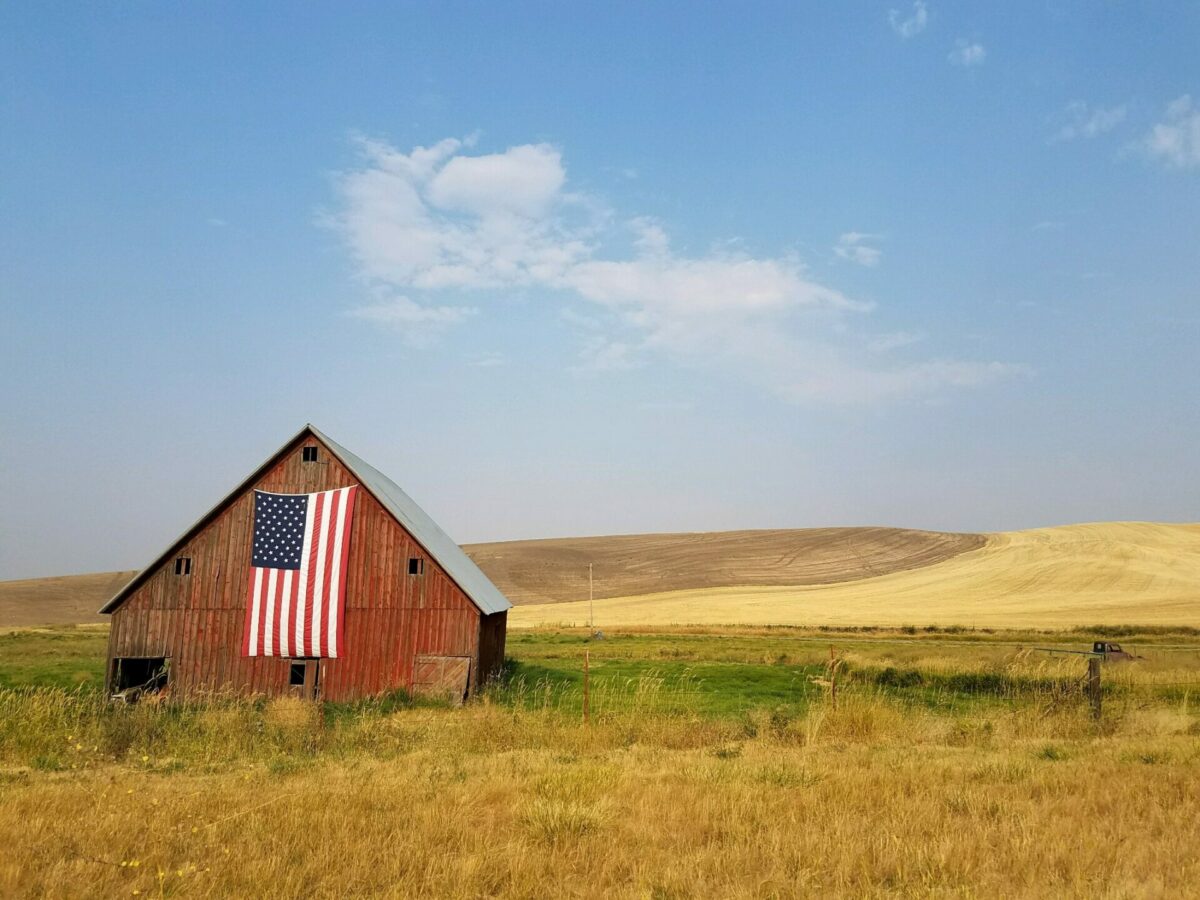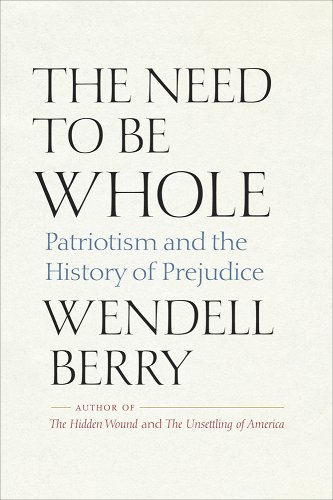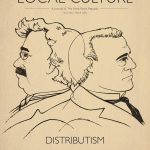This review essay appears in Local Culture 4.2: Sir Roger Scruton. To read the rest of the issue, subscribe here.
Grove City, PA. I sometimes get asked what connects my interests in media ecology with my interests in Wendell Berry. Shifting textual technologies and the news media seem totally separate from the health of the soil and its creaturely communities. But Berry’s new book, The Need to be Whole: Patriotism and the History of Prejudice, is his most fulsome account of how his agrarian and communal convictions shape his perspective on the shortcomings of our contemporary public discourse. He’s written on these connections before—in essays such as “In Defense of Literacy” and “Standing by Words”—and though his new book will make headlines for its discussions of racism and Civil War monuments, its real subject is how we might address our many political and economic and cultural challenges by learning to speak a more truthful and loving language.
It’s no accident that the book’s opening and concluding chapters focus on the failures of public speech. Such discourse perpetuates the abstractions of prejudice and stereotypes and inevitably authorizes violence toward its objects. At one point, near the end of a lengthy passage exploring Ernest Gaines’s novel A Gathering of Old Men, Berry voices a question that many readers will surely have: “What is the use, in a book about race relations, of paying so much attention to language? . . . I think it is necessary, because the usefulness of our conversation about this subject, if ever we are to have an authentic one, will depend on the kind and quality of the language we use.” Practicing authentic conversation and finding healthy language have long been at the heart of Berry’s work. In the introduction to The Art of Loading Brush, Berry sums up his many years of writing as his “struggle to find or recover the language necessary to speak, in the same breath, of work and love.” That struggle continues in this new book, and what unites the many strands that run through its nearly 500 pages is his effort to imagine a public conversation rooted in love rather than fear and oriented toward good work rather than abstract or merely symbolic victories.
The result is a sprawling book that defies summary. Berry doesn’t typically write unified books; his habitual genre is the essay. Even in this door-stopper of a book—his longest by far—he doesn’t attempt to offer some grand public solution to “the race problem.” His ambition is more modest: to transcribe his side of a good-faith conversation. He follows this form because he believes “that the right model or the norm of human relations is a conversation in earnest and in good faith between two people.” Such a conversation doesn’t proceed as a linear argument. Rather, “one thought naturally would invite another thought, perhaps a counterthought, or one story would be a reminder of another story.” The book indeed feels like a digressive conversation, and Berry admits that it was a challenge to follow all the paths connected to this fraught topic:
If the difficulty of this writing is a reliable measure, I now may have thought the best I can, if still incompletely, about the past and present of race relations. Burdened as never before by the wish for neighborly human relations, which certainly would include neighborly race relations, I have been writing an essay, an attempt, which almost by definition is work for an amateur, a nonprofessional moved by love. As often before in my essay writing, in this book I have often been in water over my head, breathing through a tube. As always in confronting the past, the persistent trouble in this book is that of not knowing enough: the impossibility of gathering into one consciousness all that has been recorded, and the more daunting impossibility of knowing the experience that was never recorded, or never told.
If I attempt to follow Berry’s underwater route too closely, I’m afraid I will drown. Rather than try to summarize it, then, I will instead distill from it a set of guidelines for improving the quality of our language. The shouters who dominate our public discourse are unlikely to heed Berry’s advice, but those of us who are weary of shrill denunciations have much to learn from Berry’s sanity. If we adopt these recommendations in our own conversations, we might contribute to a more neighborly and healthy culture, one that cares for all its members and the land upon which they depend.
Include Everything
The Need to be Whole addresses a dizzying array of issues, many of them complex and controversial. It shifts from economics and agricultural policy to racial injustice or tobacco or reparations or the pandemic. Berry tackles this ambitious range of topics because he believes that we can’t adequately address any of them in isolation. Specialized solutions won’t work. As he writes near the outset of the book, “What urban liberals don’t see, and undoubtedly can’t see, is that our race problem is intertangled with our land and land use problem, our farm and forest problem, our water and waterways problem, our food problem, our health problem.” Treating an individual issue in isolation is all too often a technique we rely on to evade our responsibility; it’s easier to focus on someone else’s errors rather than grapple with our own complicity. Hence our “public language,” Berry warns, “is wonderfully adept at shirking any of its responsibilities that are difficult.” Berry’s effort in this book—and in his other writing—could well be summed up as an effort to articulate and face unpleasant responsibilities.
Consider Berry’s approach to one of the particularly fraught issues he deals with: whether monuments to Confederate soldiers should remain standing. He doesn’t issue a blanket opinion on this question. He certainly doesn’t join the crowds calling for them all to be torn down, but he also doesn’t come out and argue for the statues to remain. Instead of arguing for or against all these various statues, he uses the terms of this public debate to diagnose our deeper failures as a culture to love one another, to reckon with the complexities of our past, and to speak the truth. And he takes this opportunity to consider the nuanced history of several monuments, particularly ones in Kentucky, to show that seemingly simple questions have far-reaching ramifications. This same approach marks his discussions of reparations or the tobacco crop or Trump voters or pronouns or urban condescension or solar power: he never offers a simple affirmation or condemnation but always seeks to provide a full accounting of good and evil, benefits and harms.
Berry’s insistence on a full accounting that includes everything doesn’t leave him in some mushy state of indecision, however. He remains as capable as ever of unleashing a biting sentence. Writing about the modern fetish for labor-saving devices, for instance, he observes, “That a whole nation or people, including young people, need to be spared the effort to crank up a car window surely exceeds in luxuriousness the most slave-served aristocrats of the Old South. It is not hard to suppose that the American Dream eventually will be realized as early interment with a smart phone.” Yet his goal throughout this book is not to browbeat some set of political enemies or take sides in an ideological conflict. For it is precisely that sophomoric lust to win an argument—a lust continuously fueled by Twitter—that leads people to leave out inconvenient facts or complexifying context.
Speak for Clarity and in Love
Berry has no interest in winning some abstract argument. He writes in search of a much more difficult and elusive end: clarity. Berry spells out the distinction between these two goals:
Here I want to accept the guidance of my late friend, William Hull, who said that the way to prevent disagreement from becoming destructive is to seek “clarity rather than victory.” Clarity is what we owe, in honesty and goodwill, to one another. Victory can only divide us again into a party of winners and a party of losers, thus preparing us for further confrontation and combat. But if we hope to have clarity we will have to submit to complexity. Nothing so challenges our need for clarity as the history and the present problems of “race relations.” Nothing so urgently asks us what we mean when we say we “know” or we “understand.”
Clarity and nuance are not popular these days when politicians and pundits resort to whatever tactics will score quick points on social media. But Berry concurs with John Lewis, an activist who cut his teeth in an earlier era, who writes, “There are no losers when justice is achieved.” Berry expounds on this principle by reminding us that “any combat or conflict that divides people into winners and losers really never ends but only keeps the problem alive.” Hence he has little patience for those “assumptions and circumstances, habits of speech and individual words that appear to me to be obstacles to peace and goodwill.”
In a similar vein, Berry cites bell hooks’s essay “Censorship from Left and Right” (1994) where she argues that “any progressive political movement grows and matures only to the degree that it passionately welcomes and encourages, in theory and practice, diversity of opinion, new ideas, critical exchange, and dissent.” Berry and hooks share a belief that movement politics is dangerous because it often fails to cultivate the authentic ground of healing and growth: love. As hooks writes, “As long as we refuse to address fully the place of love in struggles for liberation we will not be able to create a culture of conversion where there is a mass turning away from an ethic of domination.” This may seem like a tall order, and in pursuing it we may be sorely tempted to wield whatever rhetorical tools promise to defeat our enemies. But Berry insists that such apparent victories will always be pyrrhic: “it will be easy for the side of love first to understand love merely as opposite and opposed to hate, and then to generalize this opposition as an allegorical battle of Love versus Hate, exchanging slogan for slogan, gesture for gesture, shout for shout. Then if nature and the rule of battle go unchecked, the side of love begins to hate the side of hate. And then the lovers are defeated, for they have defeated themselves…. [L]ove that hates has canceled itself. It cannot survive its hatred of hate any more than one can survive minus one.” Such a commitment may seem to put those who pursue clarity and love at a disadvantage in our public debates, but the joy of being on the side of love is that we will never be alone. As hooks reminds us, in “choosing love we also choose to live in community, and that means that we do not have to change by ourselves.” The goal of public speech, then, should not be victory but love. Hooks and Berry are not interested in rallying mass movements populated by swarms of angry individuals; rather, they want to foster communities committed to seeking the truth in love. It is doubtful that members of such communities will need yard signs declaring that “love is love,” which, being a mere slogan, aims to divide.
Refuse Totalizing Categories
The pursuit of clarity is messy because reality is messy. It would be much easier to settle fraught political questions about reparations or monuments if there were merely two sides, one good and one bad. The corollary of viewing issues in this binary way is to treat people as more or less fungible representatives of some racial or social or political category. If we succumb to this temptation, we operate according to the logic of the industrial economy that reduces the land and its members to mere commodities. So even though much of our political discourse today traffics in simple categorical denunciations of the wrong people, Berry challenges us to resist these always falsifying categories: “It is too bad that our history is so discordant, so mixed and tangled. But every good possibility now depends upon our willingness to resist simplification and to know the complexity of our story as it was.”
Abstract categories are the currency of those who seek political victory, but they are deeply damaging:
Because we live now in such self-diminishment, we seem to have agreed to conduct our public conversation about race and racism in terms highly generalized, unexamined, and trite: bare assertions and accusations, generalizations, stereotypes, labels, gestures, slogans, and symbols. This sort of language is useful only to those who see conversation or dialogue as combat, the aim of which is only to win. This is the combat in which people use prejudice (pre-judgment or judgment-before-knowledge) to prove their superior virtue—even, ostensibly, to correct the bad conduct of an enemy—by giving an insult, the more wounding the better.
Berry’s concern is with the ways in which our public discourse and our broader media ecology make it difficult to question or correct the pre-judgments that our group holds and signals. Much online discourse consists of a narrow range of gestures aimed to deflect thought and confirm us in our rightness. When we read or encounter ideas and arguments that might qualify our views, this repertoire of gestures is at hand to dismiss them: this person must be engaging in whataboutism or gaslighting or fake news or clickbait or dog whistling or a dangerous violation of “norms.” Of course, the more common move is simply to express our righteous outrage: they are saying the quiet part out loud! What meme will best convey my horror and disgust with this view?! When public discourse consists in wielding various symbolic categories with the aim to give maximum insult to one’s enemies and maximum affirmation to one’s friends, we lose the ability to deal honestly and rigorously with the complexities of an issue such as racism, and authentic conversation becomes all but impossible.
Berry insists that all who play by the rules of this game, no matter what cause they may ostensibly serve, contribute to the problem:
Once a large public division is established over some single perfectly divisive issue, such as abortion or Confederate monuments, and once the difference begins to be expressed in name-calling and slogans, then reconciliation becomes impossible. Conversation between persons and public discourse among leaders have been replaced by weaponized language emblazoned on placards and T-shirts. There is no point or value in any political side’s protest that its labels and slogans are harmless because of their truth. Once the labels and slogans are in the air, both sides are speaking the language of perfect division, which is to say the language of mob action or warfare. They are using language as a weapon, or set of weapons, by which opponents are made enemies. The people designated by this language are no longer actual or individual persons. They are becoming, or they are, targets.
When we are surrounded by this kind of language-as-weapon, and particularly if we find ourselves or our friends targeted by such language, we may feel that our only option is to respond in kind. It is at this juncture that we must refuse to escalate the shouting and instead turn the other cheek.
Indeed, one of the features of Berry’s thought that distinguishes it from the shrill and interminable condemnation by category is his profound sense of his own complicity, his own sin. This is a Christian conviction that has been lost as our political discourse becomes increasingly fixated on condemning our opponents and exonerating ourselves. In this regard Berry’s attitude is much the same as that of Cornel West, who likewise insists on his own complicity in the wrongs he abhors. As West explains in an interview, “When I was in Charlottesville, looking at these sick white brothers in neo-Nazi parties and the Klan spitting and cussing and carrying on, I could see the hounds of hell raging on the battlefield of their souls. But I also know that there’s greed in me. There’s hatred in me. People say, ‘Oh, you’re so qualitatively different than those gangsters.’ I say, ‘No, I’ve got gangster in me. I was a gangster before I met Jesus. Now I’m a redeemed sinner with gangster proclivities.’ It is a very different way of looking at things than many of my secular comrades.” This commitment to acknowledging our own weaknesses and failures enables us to live in community with other people who, quite possibly, have many faults of their own. These communal commitments fundamentally change the nature of our ongoing and inevitable disagreements.
Prioritize the Communal over the Public
As Berry has been arguing for decades, the dysfunctions of our public discourse stem directly from the decline of vibrant community life. He returns to this dynamic repeatedly in The Need to be Whole, lamenting that no public speech can make up for the loss of local conversation, culture, custom, and courtesy. In the absence of these relations, “we have become a public people, upwardly or downwardly or laterally mobile, within a vast national and economic public as unsettled as the inside of a corn popper.” When intact communities are hollowed out, and when more of our conversations take place in a digital public square, our language inevitably lapses into generalizations and stereotypes.
Public language certainly has an important role to play, but it can’t replace the interplay of conversation among people who share a history and a set of common referents. Pointing to the example of the conversations in Gaines’s A Gathering of Old Men, Berry contrasts their language with the limitations of public speech: “Compared to so truly communal a language (as found in Gaines’s novel and in coherent communities), so complexly and intimately referential, a language merely public or standard is a blunt instrument. To say this is not to imply a rejection of public language, in which I am now writing, but merely to acknowledge one of its limits.” What we need is a healthy exchange between local communities and a broader public: “Without a sustained movement of conversation back and forth between the public and the personal, the general and the particular, Equality and Justice decline toward nonsense…. Particulars are measured and oriented by generalization, and generalizations are enlivened and tested by particulars.” Throughout his book, Berry practices this movement by returning to the particular history of his family and county and state to think through the nuances of such ideals as Equality or Justice.
The limited yet necessary role of public language parallels, for Berry, the limited yet necessary role of public solutions to local, personal problems. In the context of the Civil War, for instance, the local communities of the antebellum South were deeply infected by slavery and its manifold evils, and Berry laments that despite his committed pacifism, it’s hard to imagine any other way of ending chattel slavery apart from war. But that doesn’t mean the North’s victory in 1865 “solved” the problem of racism and the exploitation of humans. A too-simple narrative about the Civil War—it was a good war that ended slavery—obscures the tragedy of the war and its inability to promote convivial, caring communities. As the failures of Reconstruction in the South and the industrial violence unleashed by the North’s victory demonstrate, “human beings cannot be made virtuous by force.”
The Civil War and America’s subsequent wars, particularly World War II, furthered the dissolution of community life and the mass uprooting of people. “Moving a problem from place to place,” Berry notes, “almost certainly makes it harder to solve.” In the case of racism, the loss of community life leads to a reliance on stereotypes and other forms of abstract references. Under the conditions of “settled life, proximity, mutual knowledge, neighborliness, respect, affection, and the sense of ‘what is right,’” racial and other forms of prejudice can weaken. These prejudices depend for their force on public convention, on the official work of reifying stereotypes that depend for their plausibility on a lack of personal knowledge. Social mobility fuels prejudice and leads us to treat persons as members of abstract categories. As scholars such as Willie Jennings have argued, modern racism is a result of the mobility set in motion by the Age of Discovery and European colonialism. In the context of nineteenth-century American life, the manifold ties of civil society also seem to have weakened racial prejudice and led to greater legal rights for free blacks. Eric Foner notes that states outside the Confederacy with the most racist laws were those with the most fluid economies and societies: “Where the social order was least stratified—as in the frontier states of Kansas, California, and Oregon—legal discrimination was most severe. Thus, paradoxically, the very social mobility for which the West has been celebrated may have tended to exaggerate racial prejudice.” Berry reiterates at several junctures that public solutions are sometimes necessary to combat the kinds of injustice that can fester in local communities, but he also maintains we must recognize “the limits of public solutions”: only the work of love is sufficient to heal these wounds.
Take up the Work of Care
If the movement toward local community grounds our language in particulars and helps us converse with the goal of clarity, it also provides us with opportunities to do good work. When our attention remains focused on the national, public discourse, we can believe that tearing down a monument, issuing a resolution, signing an open letter, or changing the background on our social media profile counts as action. At the same time, the mundane, unnoticed work of neighborly care seems boring and unimportant, yet this is precisely the work that matters.
Berry traces our cultural devaluation of necessary work to the corrosive effects of slavery, which associated much important work with people who were oppressed and viewed as subhuman. Berry mourns that slavery “degraded the fundamental work itself, in both status and quality. It degraded everybody, black and white, who did that work. And inevitably—provided that the workers consented to the aristocratic values and attitudes—it degraded the land on which the work was done.” At the core of this degradation was a false definition of what it means to be a human: “The first reduction … was from human in the full, fine sense of the term to the category of human-as-work-animal. Under the rule of industrialism, there was a further reduction to human-as-industrial-machine, and then, by a merely logical progression, to the displacement of the human-machine by a machine.” As Berry’s sequence indicates, though chattel slavery has been abolished in America, its reductive view of humanity remains widespread.
In one of his classic essays, Berry asks a fundamental question: “What are people for?” Is our telos really just luxury and amusement and consumption? Berry writes from the conviction that we all have vocations, callings to care for our places and their members in particular ways. These vocations are at once religious and practical. And paradoxical though it may seem, happiness (in the rich sense of eudaimonia) and authentic leisure are found when we embrace these callings rather than evade them by hiring or constructing replacements—replacements who are then denigrated and despised. And the bill for this reductive view of our human purpose is coming due: “To despise conventionally the working people of the countryside and the industrial ‘workforce’ of the cities, at the same time replacing them with technology whenever possible, is a dead-certain way to build an immense popular fund of resentment and anger. The genius of modern conservatism has been to turn that resentment and anger not against the money-people and corporations who have controlled the economy in their own interest, but against labor unions, ‘welfare cheats,’ ‘environmentalists,’ and other harbingers of ‘socialism.’” An authentic response to this false anthropology, however, would build an economy and culture that values necessary work and recognizes it as essential to fulfilling our human responsibilities.
Despite his many frustrations with our political and economic and racial problems, Berry returns consistently to what draws his love rather than to what provokes his anger. He does so because “the right motive for work … is love. Love, to begin with, clears the mind of the oversimplifying, mind-destroying emotions that prepare us to make war. When our minds are clear, our eyes are free to look around and see where we are, and who all and what all are there with us.” Much of his book draws on his personal and literary friendships and the history of his family and community as he seeks examples of reconciliation, justice, and mutual care across racial divides. At the heart of all these landmarks of hope he finds love:
It is love that leads us toward particular knowledge, and it helps us to learn what we need to know. It leads us toward vocation, the work we truly want to do, are born to do, and therefore must learn to do well. I am talking about the hardworking familial and neighborly love that commits itself and hangs on like a hair in a biscuit. This is love that can be enacted, whether or not it is felt.
Berry’s ultimate challenge for his readers, then, is to find ways to enact our love for other people and for creation, first by engaging in authentic conversation and then by rolling up our sleeves and going to work. For it is when we put our love to work that we fulfill our identity as those made in the image of a loving Creator. And in obeying this vocation, we may yet hope to be whole.









5 comments
David Marshall
Thanks for this, Jeff. I do have to wonder how Berry keeps his finger on the pulse with cultural matters, so to speak. Has he written about this before? It has to be strange, watching the world in such a chaotic state, yet also being so far from being immersed in the chaos as well. At least in regards to digital communication, technology, and such.
Martin
Great article, Jeff. I was particularly struck by your comment on Berry’s admonition about the narrowmindedness of urban liberals: “Treating an individual issue in isolation is all too often a technique we rely on to evade our responsibility; it’s easier to focus on someone else’s errors rather than grapple with our own complicity.”
Ironically, the increase of “heat instead of light” (an old quip about argumentation) has even undermined holistic thinking in the field of ecology. The latest panic-du-jour in environmentalism is methane’s role as a greenhouse gas, with evidence and counter-evidence that termites produce more than cattle. Somehow both types of animals are viewed in isolation, as if cattle were mere bags of meat and gas taking up space on otherwise pristine pastures, or termites were merely a nuisance rather than a necessity for accelerating the decay of wood in humid climates.
The larger point about approaching communication through love was addressed in a 1999 essay by Thandeka, a black woman who is a Unitarian Universalist minister:
https://revthandeka.org/wp-content/uploads/2018/03/Why_Anti-Racism_Will_Fail.pdf
Lucas Nossaman
Yes, thank you, Jeff. Carlson’s essay is helpful, too, for understanding the history is Berry is drawing from. I am very much looking forward to reading Berry’s latest.
Russell Arben Fox
“Berry reiterates at several junctures that public solutions are sometimes necessary to combat the kinds of injustice that can fester in local communities, but he also maintains we must recognize ‘the limits of public solutions’: only the work of love is sufficient to heal these wounds.”
And that, right there, is the central dilemma, the central preoccupation, and the central hope of any and all attempts to realize justice or righteousness or any other moral truth in a way which does not, at the same time, rest entirely upon some kind of violence or will-to-power. As Glenn Tinder wrote in The Political Meaning of Christianity, speaking of the unavoidable harms but also the unavoidable necessity of public action: “Although the dignity of persons is inevitably violated in action, this dignity would be far less recognized in the world than it is had it not been supported by actions such as the establishment of constitutions and the fighting of wars in defense of human rights….Action cannot but be anticommunal in some measure, yet communal relationships would be almost nonexistent without areas of peace and order, which are created by action. We must act hesitantly and regretfully, then, but still we must act.” To the extent that speaking and thinking do, or at least should, come before, or at least alongside, acting, this review makes me even more anxious to read Berry’s latest, as it might seem to present a wise, and essential, guide to loving, necessarily, acting.
Thanks for this great review-essay, Jeff; it’ll keep me thinking for a while, I’m sure.
Martin
Yes, Russell, it is the central dilemma. But in recent years, I look askance at claims of “reluctance” when wars are fought in the name of “humanitarian intervention” rather than territorial conquest. People die either way.
I think a particularly destructive meme that is indirectly related to public action is the insistence on “equity of result” because people demanding change want tangible measurement of their favored statistics rather than mere “equality of opportunity”. The latter requires trust as well as patience that the river will flow without being pushed (old Barry Stevens metaphor).
Comments are closed.